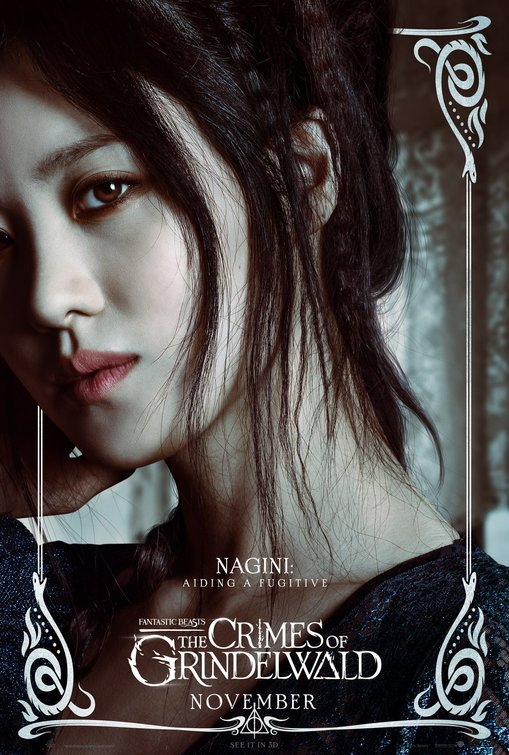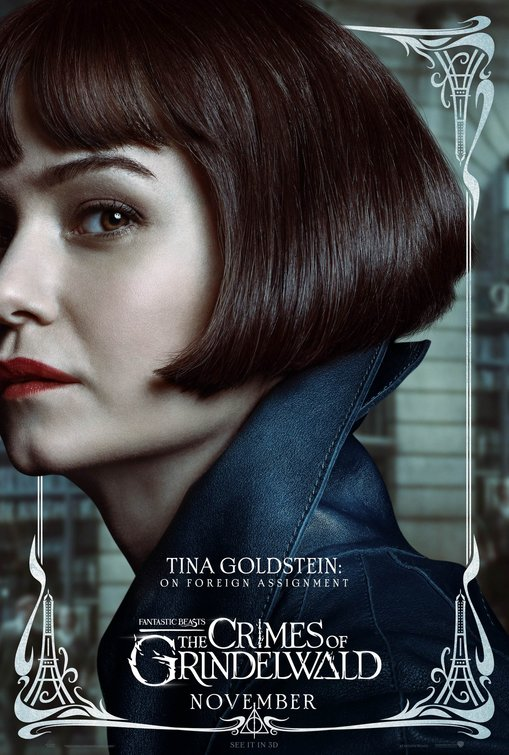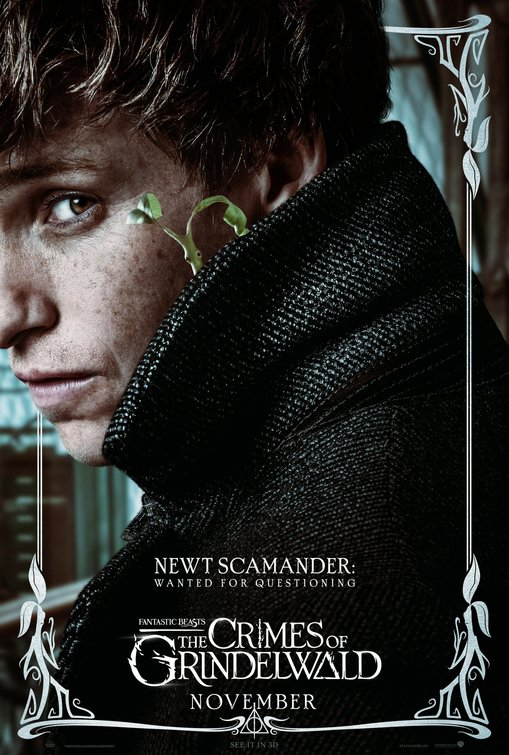Movie Review: The Crimes of Grindelwald

JK Rowling's Wizarding World franchise promises many things to the audience. Whimsical worldbuilding, cool and visually-exciting magic, high stakes and high adventure, a clash between clearly-defined good and evil. These elements enchanted a generation of schoolchildren when her books were published in the late 1990s, and bedazzled two generations of moviegoers in the film adaptations.
On every count, Fantastic Beasts: The Crimes of Grindelwald fails to deliver.
(Spoilers ahead!)
The Stench of Modernity

The Crimes of Grindelwald is set in 1927, a year after the previous film Fantastic Beasts and Where to Find Them, but the audience would be forgiven for thinking the movie is set in 2017 in period dress.
Fashion, architecture and turn-of-the-century aesthetics aside, there is little to distinguish between the Europe of 1927 and the Europe of 2017. There are the obligatory Strong Female Characters, the everyday presence of minorities in positions of power and authority in overwhelmingly white societies, the casual use of modern-day speech and cadence. Past the visuals, there is little here to sell the illusion that the story is indeed set in 1927.
It may be trendy among allegedly historical media to make concessions to modern fashions and ideas. But in The Crimes of Grindelwald, these capitulations are completely squandered.
The character of Nagini is emblematic of the stench of modernity that permeates the film. She is introduced as a Maledictus from Indonesia, bearing a blood curse that will permanently transform her into a snake, and the main attraction of a circus freak show. Until the curse takes full effect, however, she can shapeshift into snake form and back at will. And what does she do with her power?
Nothing.
Throughout the film, Nagini does exactly nothing that affects the plot. Her ability to transform into a snake is used just twice on screen, once in her introduction, and once in a forgettable 'action' scene. In fact, she barely has any spoken lines.
The only reason she is on-screen is to establish a connection, however tenuous, between the Fantastic Beasts timeline and the better-known Harry Potter franchise. And to serve as eye candy. If she were removed from the film, the story wouldn't suffer for it.
Nagini is everything feminists and Social Justice Warriors rail about: a token minority female.
But Nagini isn't the only token minority in the movie. Everybody is a token minority.
Cherchez de la Femme

The Crimes of Grindelwald begins with a decent premise. Dark wizard Gellert Grindelwald, arrested in the previous film, escapes from custody and goes underground in Europe. Meanwhile, Credence Barebone, who destroyed half of New York, has resurfaced in Paris. Alleged protagonist Newt Scamander is censured for the devastation of New York, and has his travel papers revoked. The British Ministry of Magic offers Newt a chance to have his rights restored, in exchange for assisting his brother Theseus to locate Credence.
Naturally, Our Hero refuses.
Soon after, Albus Dumbledore -- at the time a mere teacher of the world-famous Hogwarts School of Witchcraft and Wizardry -- attempts to recruit Newt to recruit Credence.
Once again, Our Hero refuses.
Refusing the call to heroism is a classic fantasy trope, and here it's employed twice. And why?
Because Newt doesn't want to 'pick sides'.
Picking sides is what heroes do. When presented with opportunities and temptations, heroes pick the side of good, righteousness and justice. This defines a hero. By refusing to pick sides, Newt refuses to be a hero.
In the end, it takes a woman to propel him to act. More accurately, two women.
Newt returns to his apartment to find Queenie Goldstein and Jacob Kowalski. In the previous movie, Jacob's memories were erased following the destruction of New York, but Queenie conveniently filled him in what he forgot in between films, and they got back together again.
Queenie and Jacob are following her sister, Tina, an Auror who happens to be hunting for Credence, because... reasons. Tina also happens to be Newt's love interest from the previous movie. Queenie and Jacob believe Tina is in Paris, because Tina sent them a postcard (because... reasons), and are making a stopover in Newt's home to announce their engagement (because... reasons).
Which would be fine and dandy, except that Queenie had placed an enchantment spell on Jacob.
After Newt breaks the spell, Queenie and Jacob quarrel over the forbidden nature of their relationship. Being a witch and a Muggle respectively, wizarding law forbids them from marrying. Upset over what he said to her, Queenie storms off to Paris.
After gathering their wits, the men decide to follow the women to Paris. Because, well, reasons.
The Token Men

Strong Female Characters are the order of the day in this movie, and they feature prominently in the dynamics of both romantic relationships.
Queenie is a witch with incredible magical powers at her disposal. Jacob is a Muggle, possessing neither magic nor any potential to ever gain magic. Somehow, they fell in love in the previous movie, and they fell back in love (maybe?) in between movies.
Characters like Jacob play an important role in fantasy fiction. Bereft of magical abilities and completely ignorant of the new world he's stepped into, Jacob serves as the audience surrogate. His reactions are the audience's reactions to the fantastic events on-screen. When characters explain beasts, magic and other phenomena to him, they are explaining them to the audience. His presence avoids the unnatural situation of characters explaining to each other what they should already know.
But in The Crimes of Grindelwald, Jacob is reduced to comic relief.
Jacob adds nothing to the story. For the entire movie, the others drag him around or leave him somewhere safe. When faced with enormous beasts and overwhelming magical firepower, all he does is take cover -- if he were present in the scene to begin with. When other characters are busy hunting for the antagonists, Jacob is relegated to makework or trivial tasks.
There is nothing masculine about the Jacob of this movie. For that matter, there is nothing of substance about him either. Every time I see him and Queenie on screen, I keep wondering what she sees in him, and what he can offer her.
Queenie could have her pick of men -- male wizards, at that. If Jacob lacks magic, he must compensate for it in other areas, areas which she finds attractive. In this movie, he has no opportunity to demonstrate courage, integrity, determination, or any other virtue. He has become a husk of a man.
Indeed, Jacob is so hollowed out that he sees nothing wrong with Queenie casting an enchantment spell on him. A spell that robs his free will and forces him to adore her constantly -- and it's strongly implied that she would never have lifted the spell of her own volition.
And yet, after a quick exchange of lines, the entire episode is forgiven and forgotten. For the rest of the movie, Jacob continues to pine after the woman who had stolen him from a successful career as a baker, taken him to a strange and unforgiving world, and stolen his free will.
This is not how self-respecting men act. Only orbiters and slaves who delight in being used and abused. Quite simply, the Jacob of this film is pathetic -- and utterly useless. Like Nagini, if his presence were cut from the movie, the story would suffer little.
What's even stranger is that nobody in the film sees anything wrong with a witch using an enchantment spell on a Muggle to get him to fall in love with her, despite the allegedly strict laws forbidding wizard-Muggle relationships. Nobody thinks it odd that a witch would do that, or even pauses a moment to think through the implications. But Queenie gets a pass, because she is female and is the designated love interest, and must be a Sympathetic Character for the audience.
As for Newt Scamender, he isn't much of a protagonist.
Newt is an academic who specialises in magical beasts. Yet unlike the previous film, magical beasts only play a minor role in the plot.
He is the wrong man in the wrong place at the wrong time. Such a character can be interesting, if his weaknesses are constantly exposed and he must learn to overcome them somehow, or use his strengths to his advantage.
But this doesn't happen. Magical beasts only contribute to the plot a couple of times in the story, and have no role whatsoever in the climax. For that matter, Newt doesn't even factor into much of the story.
Throughout the hunt for Credence and Grindelwald, Newt offers no penetrating insights, finds no valuable clues and fights no major foes. His expertise comes up only in a few situations. He demonstrates some courage and persistence, to be sure, but there is nothing he has done in the story that one-off minor characters can't do. Most of the time, he is simply sidelined or treated like a supporting character.
Newt is a geek in a story that has little need for geeks as specialist as him.
By contrast, his love interest, Tina Goldstein, is an Auror. She isn't just a magical law enforcement officer; Aurors must possess strong academic credentials and complete intensive training, making her an elite witch in a world defined by elitism.
Like her sister, she can have her pick of men, including the elite of the wizarding world. What does she see in him? What can he offer her? A compliment comparing her eyes to a salamander's?
There is no substance in this romance, and it shows. When Newt and Tina are on screen, there is no sense of attraction, much less connection. She is all business, he follows her lead. He helps her out with her work, but displays no obvious sense of attraction and does little to touch her heart.
When a major romance scene occurs, it comes out of nowhere and is painfully awkward. The characters lose their nerve, mumble and stutter, and act like hormone-addled teenagers -- entirely out of character given the perils they have faced up and their prior interactions.
The romance, quite simply, is forced.
With a hero who doesn't act like a hero and a romance that isn't a romance, what else is left to the story?
Nothing.
The Bloated Corpse of the Wizarding World

Much of the movie hinges on Credence's search for his identity. Grindelwald lays down a false trail, leading all the players to a cemetery, where he unleashes his master plan:
A rally.
A rally for his followers to explain his grand vision of 'freedom', show the coming horrors of World War II, and offer the characters present a chance to join him.
That's all.
Throughout the film, there is nothing at stake. There is no reason for Grindelwald to manipulate everyone into running around all of Paris; he could simply hold his rally and get on with his plans. Rally aside, nothing Grindelwald does in the movie serves his goal of having pureblood wizards dominate the non-magical world. Credence is a classic antivillain who only wants to know who he truly is and poses no . There is no master plan, no impending doom, no sense of urgency.
The only major conflict in the story comes from the LeStrange siblings, themselves side characters in a movie filled with them. Yusuf LeStrange has sworn an Unbreakable Vow to take revenge on Credence -- but his sister Leta shows that there is no longer a reason to take revenge.
The entire story is a sprawling, bloated mess. There is little at stake and little of consequence happens in every scene. Many characters, including the protagonist himself, play bit parts and add little to the story. The villains don't qualify as proper villains. The romance dynamics are hollow and forced.
Fantastic Beasts: The Crimes of Grindelwald is what happens when creators prioritize making a statement over making a story. I can't recommend watching this movie, for there is no movie here -- only an assembly of moving images.
--

If you'd rather spend your time on action-packed, tightly-written entertainment, check out my latest novel HAMMER OF THE WITCHES.
Congratulations @cheah! You have completed the following achievement on the Steem blockchain and have been rewarded with new badge(s) :
Click here to view your Board of Honor
If you no longer want to receive notifications, reply to this comment with the word
STOPTo support your work, I also upvoted your post!
Do not miss the last post from @steemitboard:
Wow, this was a long review, so to be honest, I didn't manage to read through all of it... but I got to say that I am not a fan of these movies at all, and I didn't even enjoy the Harry Potter movies that much, so based on your review, I don't consider this a movie worth watching for me.
I just spoke to a family member who watched it in cinema yesterday, and she said that she enjoyed the first movie, but this was way to long and not at all as good as the first one...